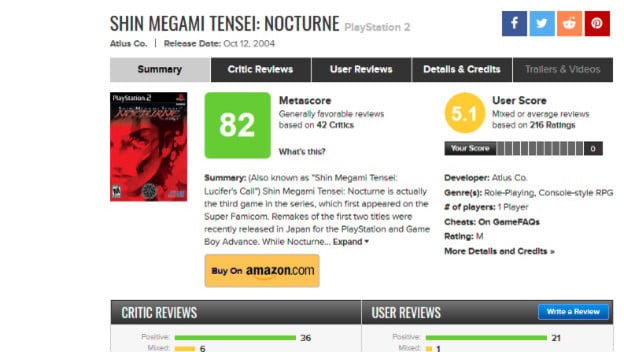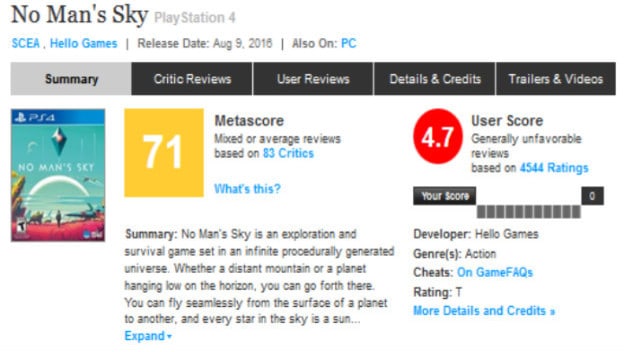You just finished a brand new video game, and you loved that stupid thing. You sat in front of your happy box for nearly 48 straight hours, then shed tears as the credits slid down the screen and faded to black. Finishing this game left a void in your soul that could only be filled by one thing: talking about it on the internet. So you hop aboard the online hype train, rev the engine, and start choo-chooing over to Metacritic, GameFAQs, and other social spaces for video games. Then your world crumbles to dust as you see your new love tarred and feathered by your fellow gamers to the tune of so many ones and zeroes. The critic reviews are more mixed, but you’re painfully aware of how the general public perceives critics in 2019 and how much people like to glance over user scores without reading them. You despair, but only for a moment as the rage takes over. The toxins course through your veins, and you smash the Caps Lock key before writing a takedown of all these philistines in your midst. You submit the manifesto, but not before pressing the ten button. Defeated, you have become part of the problem.
Folks, I have a serious beef with user reviews. I know how that looks at first glance–I’m a professional critic after all–but stick with me for a minute here. I love getting paid for writing about games, but I don’t feel personally threatened by user reviews. This isn’t about critics and journalists getting disrespected or ignored in favor of influencers or Yelp review hobbyists. It’s about people using Web 2.0 platforms to cause trouble or act like jerks. Sure, it’s the internet and certain realities come with that. But at the same time, unmoderated, unlimited access to things like review spaces can cause actual harm. “Review” is a word with some weight to it, even when used by amateurs or fans instead of the job-havers.
If you look at a website like Rotten Tomatoes or Metacritic, you should be able to see the problem pretty quickly. Take a look at any movie or game that isn’t out yet, particularly one that has some hype and discourse behind it. You’ll find user reviews, and enough of them for the site to generate a number. It’s a separate number from the critic reviews, sure, but that doesn’t mean the user reviews don’t have power. Many folks out there don’t “trust” critics for whichever individual reasons. You see the sentiment all the time suggesting people would rather look at user reviews, citing an apparent credibility or believability that the average fan has over critics. Perhaps it’s an anti-elitist thing, or perhaps these persons haven’t found any critics their tastes line up with. Either way, people pay attention to those numbers.
While you can look at user reviews (especially after some time has passed) and see people engaging with the material in earnest, for the most part you’ll see one-liners, angry rants, and useless blanket statements. None of that would actually be a problem if numbers weren’t part of the equation. Reactionary people love going full throttle, so the one and ten buttons get the most use. It’s either brilliant or garbage, with few takes in-between. This inclination, combined with significant changes over the years in online culture, has led to practices such as “review bombing.” This is where the data is deliberately manipulated in order to push an agenda of some sort. Steam has been forced to change its user review structure because of that, and even Rotten Tomatoes has put small restrictions on user reviews, mostly tied to release date vicinity.

In theory, user reviews are a good thing. People like to share opinions by nature, and user-generated content has been driving online spaces for decades now. At this point, we’ve found ourselves at the next logical extreme, and that’s user-generated bad faith acting. Empty-headed user reviews and review bombing are harming these spaces, and by extension harming game developers and other creators. It’s still possible to have these things, but leaving them open and untouched by designated curators is only letting bad seeds take root and overgrow good discussion like weeds.
At the same time, having people dedicating labor to cleaning up internet junk isn’t exactly a great gig. What’s the solution? It’s hard to say, but it would be nice if people who haven’t actually done the thing didn’t submit reviews for the thing.
